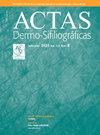Estudio prospectivo multicéntrico de casos y controles del exposoma en melanoma
IF 3.8
Q1 DERMATOLOGY
引用次数: 0
Abstract
UV radiation is the main etiological agent of skin cancer. Other factors such as pollution, diet and lifestyle are also contributing factors. Our aim was to investigate the association between melanoma and exposome factors in the Spanish population with a prospective multicenter case-control study. Case group included patients with melanoma while the control group included people who attended the consultations as companions without a past medical history of skin cancer. A total of 73 melanoma patients and 126 controls were included. The former group included more outdoor workers, a history of skin cancer, drug use (acetylsalicylic acid, antidepressants and ACE inhibitors, p < 0.05), more sun exposure (p < 0.001) and more sunburns (p = 0.04). Controls used shade (p = 0.04) or clothing (p < 0.001) and the sun protection factor (SPF) used 15 years earlier was higher (p = 0.04). Melanoma-related exposome factors are associated with sun exposure, drug intake and food. Prevention strategies should target specific populations, such as outdoor workers by promoting sun-safe behaviors and healthy lifestyle habits since childhood.
黑色素瘤中暴露体的多中心前瞻性病例对照研究。
紫外线辐射是皮肤癌的主要病因。污染、饮食和生活方式等其他因素也是影响因素。我们的目的是通过一项前瞻性多中心病例对照研究,调查西班牙人群中黑色素瘤与暴露因素之间的关系。病例组包括黑色素瘤患者,对照组包括作为同伴参加会诊的没有皮肤癌病史的人。总共包括73名黑色素瘤患者和126名对照组。前一组包括更多的户外工作者、皮肤癌史、药物使用(乙酰水杨酸、抗抑郁药和ACE抑制剂,p < 0.05)、更多的阳光照射(p < 0.001)和更多的晒伤(p = 0.04)。对照组使用遮阳(p = 0.04)或衣物(p < 0.001), 15年前使用的防晒系数(SPF)较高(p = 0.04)。黑色素瘤相关的暴露因素与日晒、药物摄入和食物有关。预防战略应针对特定人群,如户外工作者,从童年开始促进防晒行为和健康的生活习惯。
本文章由计算机程序翻译,如有差异,请以英文原文为准。
求助全文
约1分钟内获得全文
求助全文
来源期刊

Actas dermo-sifiliograficas
DERMATOLOGY-
CiteScore
1.90
自引率
9.40%
发文量
473
审稿时长
56 weeks
期刊介绍:
Actas Dermo-Sifiliográficas, publicación Oficial de la Academia Española de Dermatología y Venereología, es una revista de prestigio consolidado. Creada en 1909, es la revista mensual más antigua editada en España.En 2006 entró en Medline, y hoy resulta imprescindible para estar al día sobre la dermatología española y mundial.
 求助内容:
求助内容: 应助结果提醒方式:
应助结果提醒方式:


